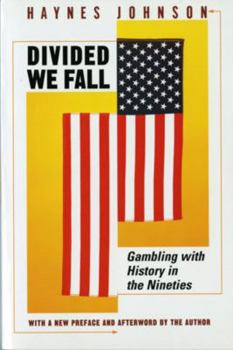Divided We Fall: Gambling with History in the Nineties
Select Format
Select Condition 
Book Overview
Over the course of two years, the Washington-based Pulitzer Prize-winning journalist crisscrossed the United States, talking to bankers, gang leaders, schoolteachers, businessmen, farmers--even President Bill Clinton--about the current state of America. The result, a powerful portrait of Americans at a pivotal point in their history, raises tough questions that continue to resonate.
Nationwide, Americans faced the legacy of the Reagan Eighties...
Format:Paperback
Language:English
ISBN:0393313069
ISBN13:9780393313062
Release Date:April 1995
Publisher:W. W. Norton & Company
Length:446 Pages
Weight:1.00 lbs.
Dimensions:1.2" x 5.5" x 8.3"
Customer Reviews
2 ratings
Thoughtful, Penetrating Look At Contemporary America
Published by Thriftbooks.com User , 22 years ago
One of the best of the tribe of journalists who has successfully made the transition to writing full-time as a contemporary historian is former television correspondent Haynes Johnson, who has penned a wonderful series of books on American politics and social issues like "Sleepwalking Through History", a savvy and fascinating best-selling study of the Reagan's presidency and its aftermath. In this book, "Divided We Fall; Gambling With History In The Nineties", Johnson continues his exploration of the social, economic and politics realities of the times in a work that largely acts as a snapshot of the country and the polity at a particular moment in time, i.e., in the early 1990s, just after Bill Clinton ascended to the Presidency. One of the things making this book special is the author's ability to draw those that he interviews out of themselves, and as a result he mines some fascinating data from the wide range of people he contacted while making a kind of sentimental journey across America. He found that people quite consistently voiced concerns and reservations about the same kinds of issues; employment, race, education, public schools, and also about traditional values and what their place in contemporary America should be. At the same time, Johnson counterposes against this series of vignettes and interviews details of the inner workings of the early Clinton presidency in all its hoary (or perhaps gory) complications. Faced with unpleasant choices about where we are, where we want to go, and how to get there, this point/counterpoint perspective has some interesting points to make about the state of the country and the culture. Thus, this is a book that paints an indelible and unforgettable portrait of today's modern America, a country characterized by the common people feeling estranged and disconnected from the government and from what it seems to be about based on what the people seem to hear about it every day. This results in a kind of free-floating anxiety and disappointment about our seeming inability to make the necessary changes needed to face a turbulent and complicated future. As always, however, Johnson finds reasons for hope and optimism, and some of the individual narratives provide ample proof that idealism isn't dead, that there are people who passionately care about their country and their values, and who are actively involved in trying to make this a better country and a better world. In summary, this is a worthwhile book that squarely faces those problems and issues central to our growth and vibrancy, and which also explores the contemporary scene with uncommon verve and understanding. Johnson is an uncommonly good writer, just as he was always such a terrifically uncommon old-school journalist. I suspect he is also a quite substantial human being! I highly recommend this book. Enjoy!
Sleepwalking Through America
Published by Thriftbooks.com User , 26 years ago
Haynes Johnson begins his narrative analysis at the point where he finished in his mediocre political hatchet job on Ronald Reagan, "Sleepwalking Through History". For Haynes Johnson, Ronald Reagan was the reincarnation of Herbert Hoover, and the America that survived Reagan existed in one large Hooverville (Johnson has never adequately explained away the 13.5% inflation rate, 21% interest rate, the double digit unemployment, and gutted military system that Reagan was left by his noble predecessor). In the 90s Johnson finds average citizens struggling to overcome the legacy of the demon idiot King. He meets educated scholars performing manual labor (the horror!), distressed farmers, bankrupt businessmen, and a collection of people with "concerns" about crime, deficit spending, and the apparent decline in America's international prestige. Johnson could have spared himself the time and expense of his travels and just tuned into an endless stream of current political talk shows on CNN. Strangely enough, Johnson managed to cross America without ever encountering entrepreneurs, well paid workers, or anyone without an axe to grind. Johnson uses his narrative as an excuse to engage in the "gee, isn't Sweden wonderful" crystal ball gazing, waxing poetic about America's lack of commitment to long-term planning (read: National Industrial Policy, or other socialist variants of the aborted Clinton Health Care Plan described by Johnson in an earlier book). Anyone familiar with the works of Hayek knows where he's going with that arguement. A careful examination of the European economic situation (unemployment in the multiples of the American figures, crippling taxes, lack of housing, blatant legalized racism, economic stagnation) would reveal the vacuousness of Johnson's arguements.






